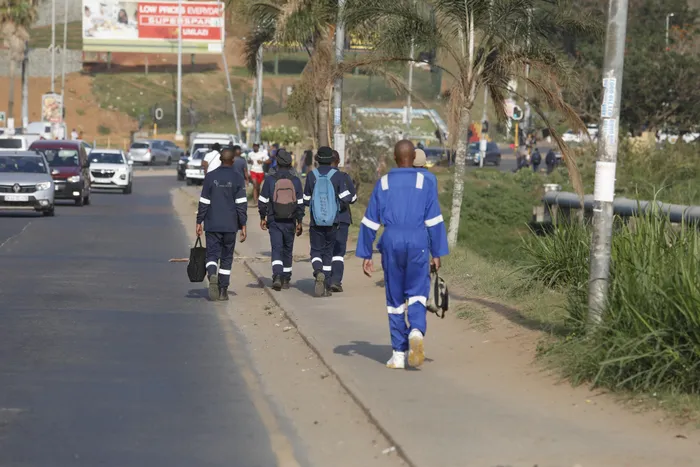Cosatu pleas against victimisation and punitive measures after Durban taxi strike

Following a disruptive taxi strike in Durban, Cosatu urges employers to show compassion towards workers affected by the chaos.
Image: Doctor Ngcobo/Independent Newspapers
The Congress of South African Trade Unions (Cosatu) in KwaZulu-Natal has called for understanding from employers after Thursday's taxi strike in Durban and surrounding areas which impacted thousands of workers who were unable to report for duty.
Last week, Durban's metro police impounded 25 taxis without the requisite permits in the Kwadabeka area, resulting in the South African National Taxi Council (Santaco) announcing a two-day shutdown on Wednesday.
The shutdown ended on Thursday evening after protracted talks between officials from the taxi industry, Durban mayor Cyril Xaba, and Transport MEC Siboniso Duma, among others.
A significant outcome of the meeting was the decision to form a joint task team.
This team will consist of leaders from the taxi industry, eThekwini municipality, and the Department of Transport, and its purpose will be to oversee the implementation of the resolutions reached during the meeting.
In collaboration with the KwaZulu-Natal (KZN) Department of Transport, the municipality also committed to accelerating the licensing process for the taxi industry to ensure a more streamlined approach.
Cosatu provincial secretary Edwin Mkhize said while the taxi industry took to the streets, fighting for their rights, the impact has been severe.
Mkhize emphasised that this was not the fault of workers.
“Workers should not be punished for a national challenge that speaks to broader socio-economic issues,” he stated.
He said most poor and struggling workers in the province rely on the taxi industry for transport.
“Cosatu KZN therefore calls upon employers to exercise understanding and not subject workers to disciplinary action or punitive measures for circumstances beyond their control,” said Mkhize.
In addition, as South Africa's largest trade union federation, Cosatu called upon its affiliated unions to be proactive in defending and assisting workers who may face victimisation or prejudice as a result of their absence during the strike.
Mkhize said the unity of workers and their allies across sectors is key to overcoming these challenges.
“As Cosatu KZN, we reaffirm our commitment to rebuilding and strengthening our relationship with the taxi industry, recognising it as an important stakeholder in the transport sector and in the daily lives of workers,” he added.
The one-day taxi strike caused significant inconvenience for thousands of commuters, including pupils and students.
The local economy was also negatively impacted as some street vendors, who rely on foot traffic, were forced to go home with unsold stock.
Additionally, those who relied on e-hailing services faced increased prices.
According to reports, in response, Bolt stated that prices on the Bolt platform in Durban and across KZN have temporarily increased due to a supply-and-demand imbalance.
"With the ongoing taxi strike, we have seen a significant rise in rider demand, while at the same time fewer drivers are online due to the risks associated with operating during this period," said senior operations manager at Bolt South Africa Simo Kalajdzic.
Uber stated that it had proactively capped any surge pricing in the area to ensure riders continued to have access to fair and consistent fares during the strike.
karen.singh@inl.co.za
Related Topics: